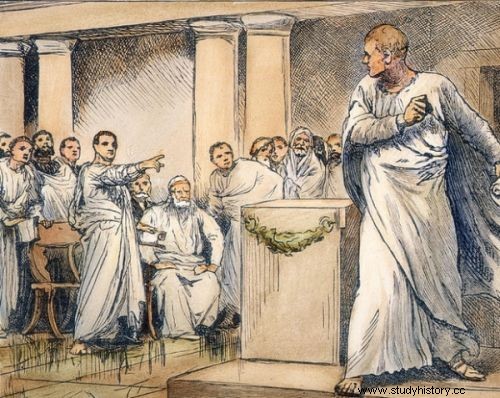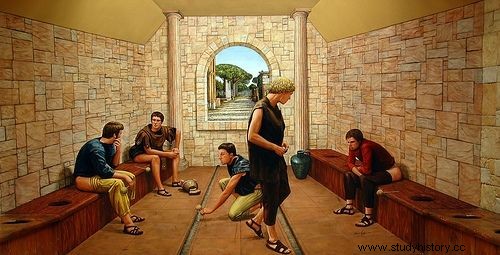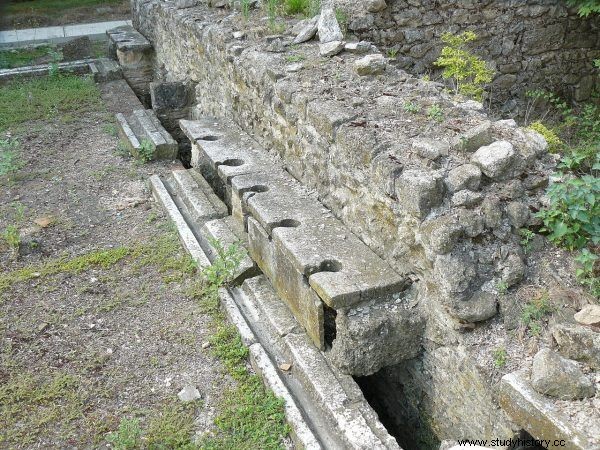b> Today it's hard to imagine a nice chat with a friend during the morning defecation together. Teenagers running to the toilet also cause consternation. It wasn't always like that. The ancient Romans were ... incredibly open in their approach to physiological functions
First, the creators of the largest ancient empire got used to the herd form of expulsion. Moreover, they considered the toilets the best place to meet and chat. Crazy practical! Why waste time shedding your morning ballast and then talking when you can combine the two?
Better in the group
The phrase "herd form" is not accidental here. The morning poop could gather even several dozen Romans in one place. Archaeologists excavating the remains of the city of Dion discovered a complex of Roman baths, which included a toilet with (attention!) Fifty seats. Even more surprisingly, these types of toilets were co-ed.
There was a risk that intense smells could damage casual conversation. Given the social role of defecation, these aromas had to be dealt with somehow. It is for this purpose that cloaca maxima - was created sewer into which sewage "produced" in public toilets flowed.

So what, guys? Are we going to the loo?
The canal, out of concern for the comfort of the city's inhabitants, was covered to keep unpleasant odors inside. After crossing the city, faeces ended up in the Tiber, the main source of drinking water for the city ... So what? A glass for health?
Not for a tombstone!
This is not the only defecation behavior that we would consider to be at least eccentric today. When you browse through the collections of Roman tombstones, you can be surprised. Among the sentences expressing sadness, regret or hope for a better life after death, we can also find some really shitty warnings. For example:
qui hic minxerit aut cacaverit, habeat deos superos et inferos iratos!
Whoever peees or nasty here will be the wrath of the gods of heaven and hell!
Why such a strange curse on the tombstone? We already explain. The Romans buried their dead outside the city walls, along the roads. The same roads were traversed by a constant cavalcade of travelers who, after all, had their mundane needs.
There were no public toilets built outside the cities, so the gentleman usually wandered into the bushes that grew by the roadside. By accident, or by extraordinary malice, he could not decorate one of the tombstones in a very aesthetic way. The quoted curse was to prevent the deceased from receiving this dubious quality ornament.
Imperial poo
The Romans, especially those from the social elite, ate a lot and unhealthy. Each dish was lavishly seasoned with a contemporary delicacy - garum. It was the main ingredient in exquisite cuisine, a sauce with a strong flavor and a disgusting method of production (it was obtained from rotten fish).
During the rotting process, various harmful substances are formed, so the process had to be supervised by professionals. Hence the exorbitant price of garum, the amphora of which was worth even a few slaves. A poorly prepared sauce could kill. Good caused shit.

Tradition does not die! This is exactly how the toilets in the New Zealand amusement park "Puzzling World" were decorated.
Rotten fish sauce, fatty food eaten until satiated, and twelve-hour feasts - as Nero, for example, used to arrange - led to various gastric problems.
Nero's predecessor, Claudius, the emperor, also famous for his unrestrained eating and drinking, especially loved boletus (which eventually drove the poor man to the grave), met the needs of the citizens.
The ruler felt alive with the tragic fate of the senator, who died by holding the gases, not wanting to offend the emperor during the feast. The kind Claudius issued an edict allowing farting in the presence of the ruler.
This is not the only episode in Claudius' life that fits into the toilet trend. If Seneca is to be believed, the emperor, just before giving up his spirit, was to release a fierce thunder from his bowels and shout: "Woe to me! I think I'm crazy! ”

Ancient Roman toilets. They definitely liked to deal in large numbers and… coeducationally.
Another lord of Rome whose fate and history were related to the question of excrement was Vespasian. Upon learning that tanners use urine to treat hides, he decided to tax it.
In response to the protests, he replied that pecunia non olet! - money do not stink. It remains to be hoped that our rulers will not read this text - and if they do, they will not be inspired by it ...
Paper is a civilization's prize!
We Europeans of the 21st century cannot imagine life without toilet paper. Taking into account the deficit of this commodity in the times of the Polish People's Republic, it can be considered a determinant of progress. People from other cultures probably do not share this opinion - Indians or Arabs are satisfied with a hand and a little water ... and how was it in Rome? In Rome, "paper" was also shared ... and reusable.
Imagining the surprised faces of the readers, I hurry to explain - not real paper, but its substitute, in the form of a natural sponge soaked in salt water. They stood in the toilet and served her customers. The author of the text is terrified by the specter of washing himself with a sponge, which was washed away from his noble part by an obese senator, but what kind of a country is such a custom.

Here it is:a reusable civilization achievement. Toilet paper straight from ancient Rome (license CC-BY-SA 3.0, author D. Herdemerten).
Holy poo
Polytheistic religions, as the name suggests, presuppose the existence of multiple deities. Until 392, the Romans were assumed to be polytheists and the deities multiplied above average. There was also a heavenly guardian of the poop.
At the forum romanum itself there was a temple dedicated to Cloacina - goddess of sewage. Interestingly - Cloacina, borrowed from the Etruscans, was also the patroness of a successful sex life, which over time began to be identified with the beautiful Venus. Who would have thought… Venus, goddess of beauty, love and shit.
With this pious accent, let's close the topic of Roman toilets. So do not forget, when you sit down on your own cozy toilet, with the newspaper in hand, pray to Venus that it may take care of the way of your impurities.
